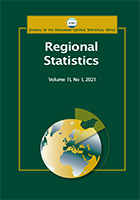Factors influencing public acceptance of self-driving vehicles in a post-socialist environment: Statistical modelling in Hungary
Factors influencing public acceptance of self-driving
vehicles in a post-socialist environment: Statistical modelling in Hungary
Author(s): Péter Kovács, Miklós LukovicsSubject(s): Social Sciences, Economy, Geography, Regional studies
Published by: Központi Statisztikai Hivatal
Keywords: self-driving vehicles; technology acceptance; post-socialist; PLS-SEM
Summary/Abstract: The majority of social science studies on self-driving vehicles has focused on accepting technology using a methodology that investigates direct relationships only. However, there is an increasing demand foran in-depth social analysis of self-driving vehicle acceptance, exploring more complex relationships. Here, this challenge is responded to by the statistical modelling of the acceptance of self-driving technology, allowing for an exploration of the direct and indirect relationships among the relevant variables. Most previous studies have also been conducted in developed countries, and limited information is available on the acceptance of self-driving technology in less developed countries. The present study constructs an explanatory statistical model of the Hungarian population’s concept of self-driving vehicles based on a representative sample of 1,001 participants. Furthermore, a graphical representation of the model is provided. The main results include the determination of the most influential factors on the acceptance of self-driving vehicles and the attribution of direct and indirect relationships among the variables, thus providing deeper knowledge than that previously obtained and complementing the currently available research results. Based on results, the expected advantages of self-driving technology have the greatest direct and total impact on the acceptance of this technology in Hungary. The enthusiasm for new technologies and the expected disadvantages of self-driving technology has a slightlyweaker direct and second-largest totalimpact. Information needs on self-driving technology, awareness of driving support systems, and perceived usefulness of new technologies had a weak but significant direct impact.The results of study will provide essential information for the successful integration of self-driving technologies into the innovation systems of less-developed countries.
Journal: Regional Statistics
- Issue Year: 12/2022
- Issue No: 02
- Page Range: 149-176
- Page Count: 28
- Language: English

